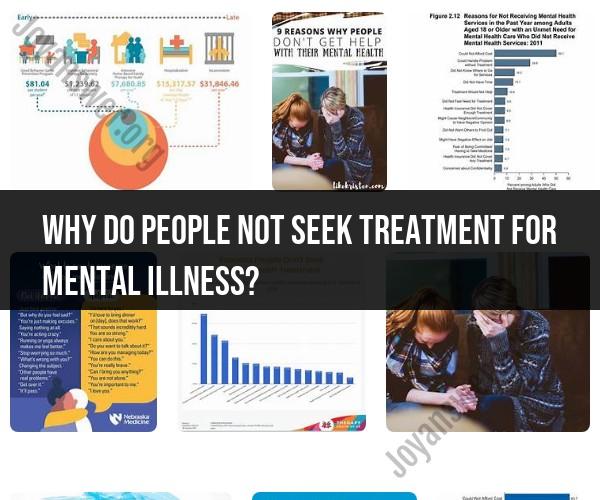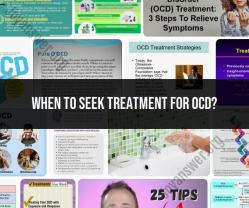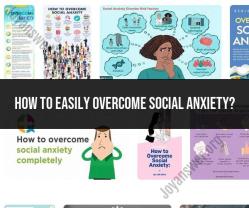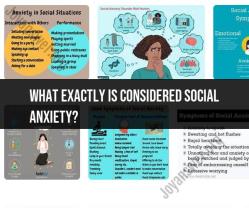Why do people not seek treatment for mental illness?
Many people with mental illness do not seek treatment for various reasons. These barriers can be complex and multifaceted, and they can vary from person to person. Some common barriers to seeking treatment for mental illness include:
Stigma: One of the most significant barriers to seeking treatment is the stigma associated with mental health issues. People often fear being labeled as "crazy" or "weak" if they admit to having a mental illness, which can lead to feelings of shame and discrimination.
Lack of Awareness: Some individuals may not recognize the signs and symptoms of mental illness or may not understand that what they are experiencing is a treatable condition. This lack of awareness can delay or prevent seeking help.
Denial: Denial is a defense mechanism that allows some individuals to avoid confronting their mental health issues. They may minimize their symptoms or believe that they can "tough it out" without professional help.
Financial Barriers: The cost of mental health treatment, especially without insurance coverage, can be a significant barrier for many individuals. Therapy sessions, medications, and other mental health services can be expensive.
Lack of Access: In some regions, there may be a shortage of mental health professionals or limited access to mental health services, especially in rural areas. This lack of access can make it challenging for people to seek treatment.
Fear of Medication: Some individuals may be reluctant to seek treatment because they fear being prescribed medication. They may have concerns about side effects, dependency, or stigma associated with taking psychotropic drugs.
Mistrust of Mental Health Professionals: Trust issues with mental health professionals can deter some people from seeking treatment. This mistrust may stem from previous negative experiences or a lack of confidence in the effectiveness of therapy.
Cultural and Religious Beliefs: Cultural or religious beliefs and practices can influence whether someone seeks mental health treatment. In some cultures, there may be stigma associated with mental illness, and traditional healing methods may be preferred over Western medicine.
Lack of Social Support: Having a supportive network of family and friends can encourage people to seek treatment. Conversely, those without a support system may feel isolated and less inclined to seek help.
Logistical Challenges: Life responsibilities, such as work, childcare, or transportation issues, can make it difficult for individuals to schedule and attend therapy sessions or appointments.
Fear of Hospitalization: Some individuals may avoid treatment out of fear of being hospitalized involuntarily, which they perceive as a loss of control over their lives.
Self-Reliance: A belief in self-reliance and a reluctance to burden others with their problems can deter some individuals from seeking help.
It's important to recognize that seeking help for mental health issues is a sign of strength, and treatment can be highly effective in improving one's well-being. Reducing these barriers and increasing awareness about mental health is crucial in encouraging individuals to seek the support and treatment they need. Mental health advocacy, education, and community resources can all play a role in addressing these barriers.
The titles you have provided highlight the importance of understanding and addressing the barriers to seeking treatment for mental illness.
The Barriers to Seeking Treatment for Mental Illness: Exploring the Reasons
This title emphasizes the need to explore the various reasons why people may avoid seeking treatment for mental illness. Some common barriers include:
- Stigma: People with mental illness often face stigma and discrimination, which can deter them from seeking help.
- Lack of awareness: Many people may not be aware that they have a mental illness, or they may not know where to go for help.
- Cost: Mental health treatment can be expensive, especially for people without insurance.
- Lack of access: Mental health providers may not be available in all areas, or they may have long wait times.
Understanding the Stigma Around Mental Health: Why Some Avoid Treatment
This title highlights the role of stigma in preventing people from seeking treatment for mental illness. Stigma can lead to feelings of shame, embarrassment, and isolation. It can also make people fear discrimination in their personal and professional lives.
Breaking Down Barriers: Encouraging Treatment-Seeking Behavior for Mental Health
This title emphasizes the need to develop strategies for encouraging people to seek treatment for mental illness. Some possible strategies include:
- Educating the public about mental illness: This can help to reduce stigma and increase awareness of the signs and symptoms of mental illness.
- Making mental health treatment more affordable and accessible: This can be done by increasing insurance coverage for mental health services and expanding the availability of mental health providers.
- Promoting positive messages about mental health: This can help to reduce stigma and encourage people to seek help when they need it.
It is important to note that these are just a few of the many barriers to seeking treatment for mental illness. There is a need for more research to better understand these barriers and to develop effective strategies for addressing them.
Here are some additional ways to encourage treatment-seeking behavior for mental health:
- Talk to your doctor: If you are concerned about your own mental health or the mental health of someone you know, talk to your doctor. They can assess the situation and make recommendations for treatment.
- Reach out to a mental health professional: There are many different types of mental health professionals, such as therapists, psychiatrists, and social workers. You can find a mental health professional who specializes in the type of help you need.
- Join a support group: Support groups can provide a safe and supportive space for people to talk about their experiences with mental illness. They can also offer information and resources about treatment and coping.
- Use online resources: There are many online resources available to people with mental illness and their families. These resources can provide information about mental illness, treatment options, and support groups.
It is important to remember that you are not alone. Millions of people struggle with mental illness, and there is help available. If you are struggling, please reach out for help.












